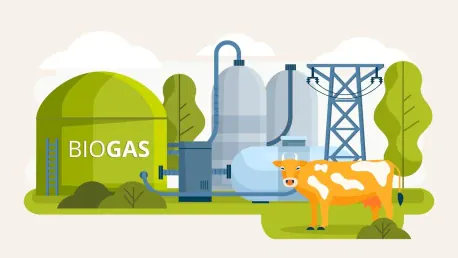Hungary has embarked on an ambitious initiative to significantly boost biogas and biomethane production. The Jedlik Ányos Energy Programme, backed by a substantial allocation of 99 million euros, aims to achieve energy sovereignty, secure supply, and enhance climate protection by ramping up the domestic production of clean energy. Currently, Hungary produces around 200 million cubic meters of biogas per year from over 100 sites. By 2030, the goal is to triple this output to reach an annual production of 184 million cubic meters of biomethane.
Focus on Small-Scale Production
Prioritizing Small Businesses
The program has earmarked 18 billion forints (44.5 million euros) specifically for small-scale plants designed for self-consumption. This strategic focus on smaller businesses is crucial, as it emphasizes their role in the broader energy landscape. Approximately 40 billion forints (99 million euros) are allocated to support the entire production process, ranging from the collection of raw materials to the utilization of residues.
To facilitate this objective, small enterprises can benefit from funding that covers up to two-thirds of their investment costs, while larger firms may receive less than half, contingent upon the availability of the remaining budget. This differentiation ensures smaller producers have ample opportunity to thrive, fostering a more diversified and resilient energy sector.
Funding Opportunities for Small Enterprises
Small businesses can apply for funding ranging from 200 million forints (494,000 euros) to 800 million forints (1.9 million euros). The program stipulates that each project must be completed by 2028, aligning with principles of environmental sustainability and the circular economy. By adhering to these principles, biological by-products from the biogas production process must be utilized in agriculture, thereby promoting a closed-loop system.
The emphasis on small-scale production highlights the government’s commitment to ensuring that investment in clean energy is inclusive and widespread. Such support aims to stimulate local economies, reduce energy costs for smaller enterprises, and ultimately enhance competitiveness within the market. This integrated approach underscores the importance of fostering energy efficiency and sustainability at all production levels.
Support for Larger Enterprises
Incentives for Larger Firms
While small businesses play a crucial role, the program also includes provisions to support larger enterprises engaged in biogas and biomethane production. Funding is available for projects requiring between 500 million forints (1.2 million euros) to 5 billion forints (12.3 million euros). Larger firms are eligible for less than half of their investment costs covered, ensuring the budget’s efficient use while also prioritizing the growth of smaller producers.
The completion deadline for all projects, set for 2028, ensures a focused and timely roll-out of green energy initiatives. By stipulating this timeframe, the government aims to create a robust pipeline of projects that will sustain growth and development within the clean energy sector, securing long-term environmental and economic benefits.
Comprehensive Sustainable Production
The Jedlik Ányos Energy Programme promotes a comprehensive approach to sustainable production, requiring that biological by-products be used in agriculture. This requirement aligns with the principles of environmental sustainability and the circular economy, fostering a holistic system where waste is minimized, and resources are efficiently utilized.
The program also underscores the importance of modernizing district heating systems and improvements in energy R&D. These measures are designed to further reduce energy costs for domestic businesses and bolster overall competitiveness. By encouraging advancements in energy efficiency, the government aims to ensure that Hungary remains at the forefront of innovative energy solutions and sustainable practices.
Future Considerations
Green Energy Expansion
The overarching trends in the Jedlik Ányos Energy Programme highlight the emphasis on expanding green energy production. This initiative is not merely about increasing output but about fostering an integrated approach that supports all scales of production. Smaller enterprises receive substantial backing, promoting localized economic activity and energy efficiency, while larger firms receive targeted incentives to participate in the national energy agenda.
Enhancing competitiveness for domestic businesses is a clear focal point, achieved through comprehensive support measures that aim to reduce energy costs and improve overall efficiency. The commitment to environmental responsibility runs through every aspect of the plan, ensuring that sustainable practices are adhered to in every step of the production process.
Long-term Impact
Hungary has launched a bold initiative to expand its biogas and biomethane production efforts. The Jedlik Ányos Energy Programme, supported by a significant investment of 99 million euros, aims to achieve energy independence, secure energy supply, and bolster climate protection. This program is focused on significantly increasing the domestic production of clean energy. At present, Hungary generates approximately 200 million cubic meters of biogas annually from over 100 different sites. By the year 2030, the objective is to triple this figure, aiming for an annual production of 184 million cubic meters of biomethane. This ambitious plan not only seeks to enhance the country’s energy sovereignty but also plays a crucial role in addressing climate change by transitioning to more sustainable energy sources. The initiative is expected to have far-reaching benefits for Hungary, helping it reduce its reliance on fossil fuels and fostering a more resilient and sustainable energy infrastructure for the future.









